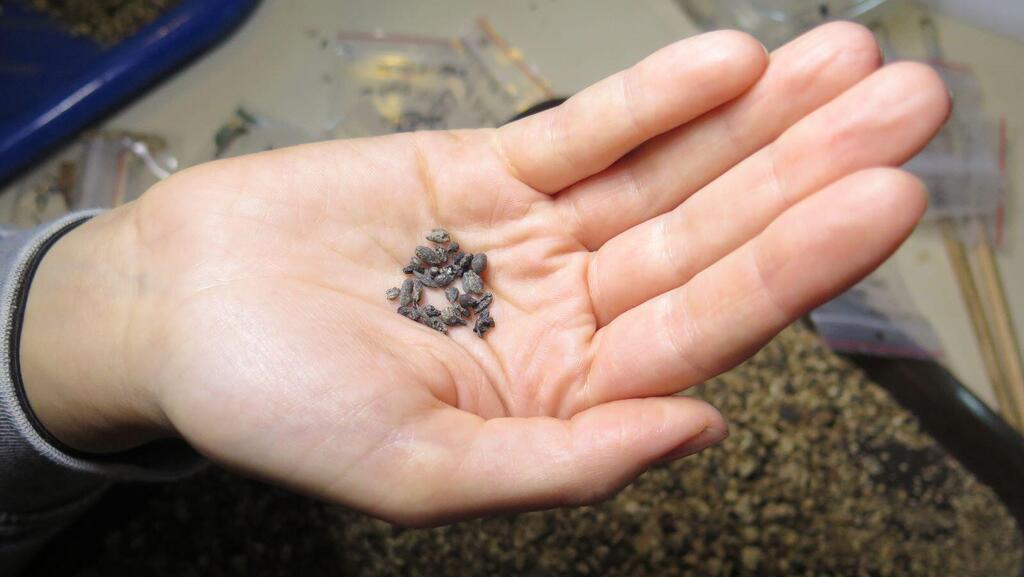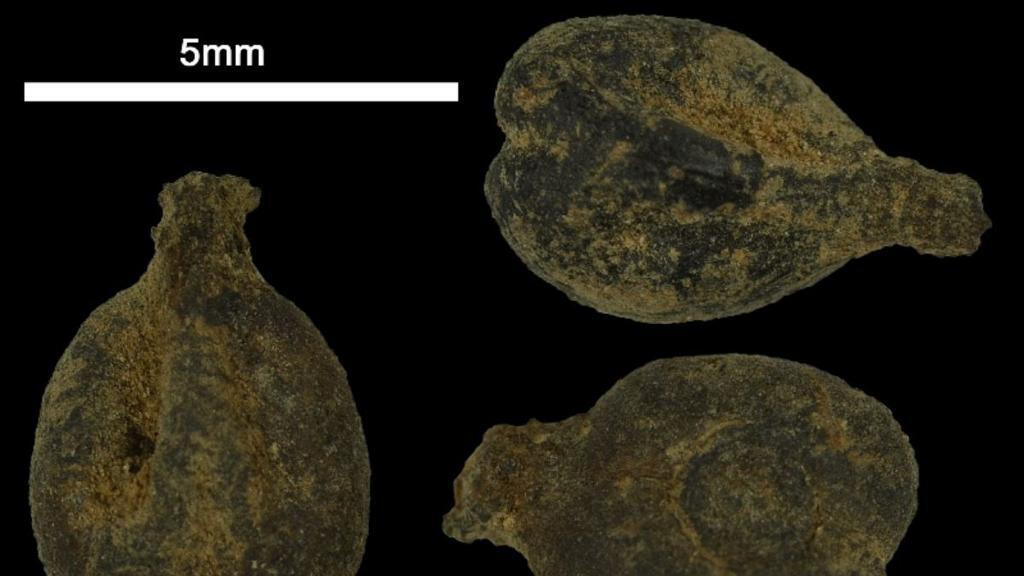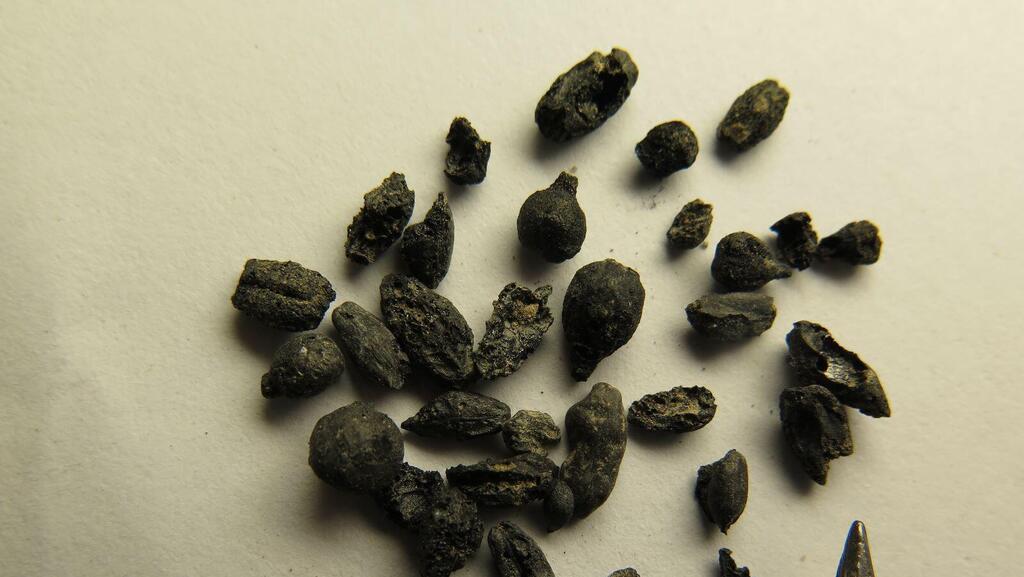Israeli researchers have discovered a genetic link between two modern varieties of red and white grapes and grape varieties cultivated over 1,100 years ago.
The researchers from the Steinhardt Museum of Natural History at Tel Aviv University and the University of Haifa analyzed DNA from ancient local wine grape seeds discovered at archaeological excavations in the Negev, and found that one seed is almost identical to the Syriki variety used today to make high-quality red wine in Greece and Lebanon, while another seed is a relative of the white variety called Be'er, still growing in deserted vineyards in the dunes of Palmachim on the coast of central Israel.
3 View gallery


Ancient wine seeds from an excavation site in the Negev
( Photo:Professor Guy Bar-On, Haifa University)
The genetic study was led by Dr. Pnina Cohen and Dr. Meirav Meiri of the paleogenetic lab at the Steinhardt Museum of Natural History at Tel Aviv University. The seeds were found during archaeological excavations led by Professor Guy Bar-Oz from the School of Archaeology and Maritime Cultures at the University of Haifa, in collaboration with researchers from the Israel Antiquities Authority. Other participants included researchers from the University of Haifa, the Weizmann Institute of Science, Bar-Ilan University, and research institutions in France, Denmark and the United Kingdom. The international study was published in the scientific journal PNAS.
"Archaeological excavations conducted in the Negev in recent years have revealed a flourishing wine industry from the Byzantine and early Arab periods (around the fourth to ninth centuries A.D.)," Bar-Oz said.
Among the artifacts uncovered by archeologists are large winepresses, jugs in which the exclusive wine, exported to Europe, was stored, and grape seeds preserved for more than a thousand years, according to Bar-Oz.
The winemaking industry gradually declined following the Muslim conquest in the 7th century, since Islam forbids the consumption of wine. The cultivation of grapes to make wine was renewed in the Negev in the 1980s, though the industry relies mainly on winegrape varieties imported from Europe.
A large cache of grape seeds was discovered on the floor of a sealed room at Avdat. The researchers explain that these seeds were relatively well preserved due to protection from climatic phenomena such as extreme temperatures, flooding or dehydration. To learn more about the seeds, in the hope of discovering which varieties they might belong to, the researchers extracted small pieces of DNA in the isolated and sterile paleogenetic lab.
The science of paleogenomic uses a range of advanced technologies to analyze ancient genomes, primarily from archaeological findings, according to Meiri.
3 View gallery


Ancient wine grape seeds from the Avdat excavation site seen under a microscope
(Photo:Professor Guy Bar-On, Haifa University)
The researchers looked for any organic matter remaining in the seeds. For this purpose, they used FTIR (Fourier-transform infrared spectroscopy) – a chemical technique applying infrared radiation to produce a light spectrum that identifies the sample's content. The researchers extracted DNA from 16 seeds which contained remnants of organic matter.
The extracted DNA was sequenced, with an emphasis on about 10,000 genomic sites where variety-specific features are usually found, and the results were compared to databases of modern grapevines from around the world. In 11 samples, the quality of genetic material was too poor to allow any definite conclusions. Three of the remaining samples were identified as generally belonging to local varieties. Finally, the two samples of the highest quality, both from around 900 A.D., were identified as belonging to specific local varieties that still exist today.
One seed was found to belong to Syriki, a known Middle Eastern variety with a long history of cultivation in the Southern Levant and Crete, still used today to make high-quality red wine in Greece and in Lebanon. Since winegrapes are usually named after their place of origin, it is quite possible that the name Syriki is derived from Nahal Sorek, an important stream in the Judean Hills. Moreover, this variety may even appear in the Bible – in Jacob's blessing to his son Judah: "He will tether his donkey to a vine, his colt to the choicest branch (soreka); he will wash his garments in wine, his robes in the blood of grapes (Genesis 49, 11); and perhaps also suggested in the giant cluster of grapes brought back by the men sent by Moses to spy out the land.
The other high-quality seed was identified as being related to Be'er, a white grape variety that grows in the sands of Palmachim on Israel's coast, in remnants of vineyards probably abandoned in the mid- 20th century. According to the genome of the seed determined by researchers, is is the oldest botanical specimen of a white variety ever identified. It is used today by the Barkan winery to make its own special white wine.
"The wonderful thing about paleogenetics is that sometimes, tiny items can tell a big story," Meiri said. " With just a bit of DNA extracted from two grape seeds we were able to trace continuity in the local wine industry - from the Byzantine period, more than a thousand years ago, to the present day."
She calls the findings "significant for Israel's modern wine industry," which has grown in recent decades.
"Our study opens new paths for restoring and improving ancient local varieties, to create winegrapes that are more suitable for Israel's challenging climatic conditions such as high temperatures and little rainfall," she said.


